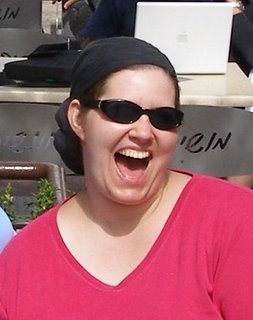We’d been in Armenia for a month and a half but so far hadn’t ventured more than an hour out of Yerevan. Knowing us, that could not stand andwith our first long weekend in this country came our chance. We made hotel reservations trough a travel agency that operates on the Embassy compound, and Daniel rented a car over the Internet through Hertz International based in the US. According to them, as well as to the Hertz.am website, the branch in the center of the city is closed on Sundays and therefore to pick up a car on this day, we would have to do it at the airport. This was fine with us as the airport was on the way out of the city in the direction we needed.
On Saturday night we frantically organized our food supplies for the upcoming two days. The supplies consisted mainly of water, hard boiled eggs, tuna and saltine crackers. Even though it was oppressively hot in Yerevan we packed warm clothes knowing we’ll be high up in the mountains the next day.
Everything was going well on Sunday morning, even with my stomach giving me issues, we got out of the house only fifteen minutes later than we'd planned. The sum on the cab’s meter was growing more rapidly than usual and only after we asked the cabby did we find out that there is a special rate to the airport. By the time we arrived there the meter was announcing over three thousand Armenian dram. No one at the airport knew where the Hertz was. With the cabby and the meter still running we searched the arrivals hall (most probable location) and then the departures hall. Nothing. We found an information booth though, but the perplexed girl
(wo)manning it was clueless. She had a computer in front of her and we saw she was able to access the Internet. We asked her to go to Hertz.am and get us the emergency numbers, but she said she is not allowed to change the webpage from the one of the airport currently on her screen. This was the dumbest thing I’d ever heard. She was not willing to change the page even after we explained to her that she could return to it after we got our desired information. We were so close to it and yet so far. For the first time, I witnessed that someone prevented this amazing research tool from doing the job it was created for. She said we had to go to an Internet Café located near the information booth. I left Daniel screaming at the girl, found the Internet Café and got the desired phone numbers for a price of one hundred dram. I called the number immediately and the guy on the other end told me to call in five minutes while they solve the problem. I found Daniel who meanwhile extracted an airport information guide from the hussy in the booth. He called the Hertz numbers as well and got the same answer.
The cabby was still with us as we made our way back to the car. The Hertz people called back and told us that they have the car ready for us in their downtown office, a ten minute walking distance from our house. An hour and half after we had left our house, we found ourselves back in downtown Yerevan with the meter at over 6,000 dram. We paid the fee lightheartedly vowing to make Hertz pay us back as well as having them fix their website so that it would not contain wrong information. When we sat down in the office the young lady in charge showed us that our reservation was never confirmed and said that she was doing us a favor by getting us a car. We responded that they have incorrect information on their website and we had been therefore wronged. After some nasty ten minutes of yelling we got the car with the forty dollar airport fee and taxes deducted, though she wouldn’t cover the cab cost.
As we started filling out paperwork, I realized I had left my license at home, since I carry a different wallet for money around the city. I got a cab from the street and returned in about twenty minutes. By the time we were ready to leave Hertz, after a least three different men checked the car and showed me how it worked, it was noon. We had supposed to have been on the way already for two hours.
We mastered the complicated and confusing directions out of Yerevan and within a half hour we were out of the city in the fertile Ararat Valley. To the right the majestic silhouettes of Mt. Ararat and its small companion peered through the summer haze. To the left, before transforming into the foothills of another mountain range, sprawled green fields of an array of fruits and vegetables. Along both sides of the road farmers had built small structures out of tree branches and hay, which were all in fact
sukkot, where they sold their crops to the passing cars.
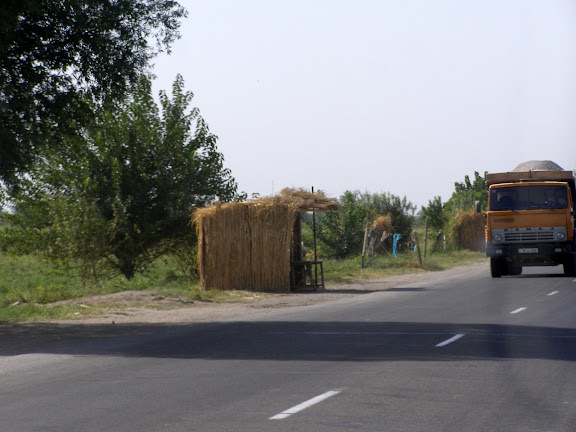 Sukkot
Sukkot on highway
After a while we got used to he sight and did not get excited when we saw a car with its back seat loaded with cucumbers or tomatoes up to the car’s ceiling, thus being displayed in the back windows of the car, or a small truck with its back loaded with a pyramid of melons, some of which tended to fall out if the truck moved to fast.
At one point, making a right turn off the highway gave us the option of taking a scenic bypass through the fields. Driving through a sleepy village, we saw local men sitting in front of the houses smoking, while the women walked by schlepping bundles of wood, or buckets with water, or just running after their tasks. After the village we drove through green fields towards the Mountain when suddenly we saw an outline of a medieval church to the right and a giant statue of a man leaning on something to the left. The church was Khor Virap, a medieval church which is much beloved by Armenians as it is the one closest to Mt. Ararat, only a few hundred feet from the Turkish-Armenian border. Armenians love Mt. Ararat more than they love their grandmothers as a fellow traveler had said and even after their death want to be close to it. On the field below Khor Virap is a large, ever expanding cemetery. Due to the excruciating heat we saved the climb and tour of Khor Virap for an other time and started toward the statue of the leaning guy.

Khor Virap church with Mt. Ararat
A seller of yellow melons and other field produce had set up his shop at a perfect photographic spot. We stopped to take a picture of the Mountain and the church, and I bought a few of the unusual tiny melons with hard, colorfully patterned skin. We then proceeded toward the guy who as the melon seller told us was an Armenian general. When we got close, we were able to see that he was leaning on a gun as opposed to an axe as I originally perceived thinking he was an Armenian version of Paul Bunyan.

Dude with gun
Back in the air-conditioned car we continued our loop off the highway. At the point where we reached the bottom of the U, we hit the Armenian-Turkish border. Two rows of barbed wire fences and watch towers secured the no man’s land between the two adversarial nations through which the Arax River flows peacefully. We drove along the Armenian side of the border and to our surprise witnessed cars passing through it. These were probably local farmers who have made a deal with the Russian guards who patrol the frontier, as the border is officially closed and impassable. As it was lunchtime, we stopped the car at a pretty spot along an Arax River tributary and snacked on saltines with tuna and cherry tomatoes.
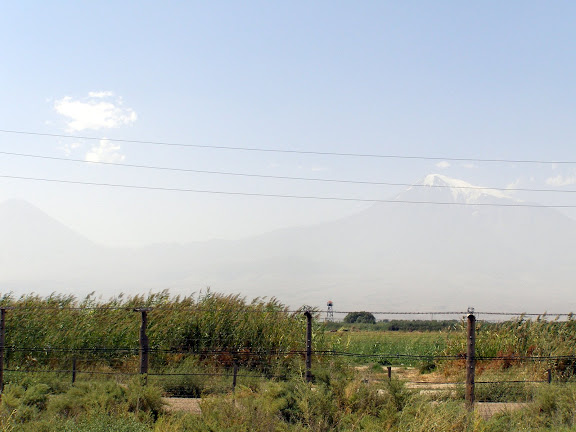
Turkish - Armenian border

Lunch

Arax River tributary - our picnic spot
Slowly we made our way back to the highway passing through many fields and a village or two. On wires near the last house of one village, we spotted a sunbird we were familiar with from The Gambia and were lucky that he posed for a snapshot.

Sunbird
Back on the main highway, before a compulsory sharp left turn towards the foothills of a mountain range and away from the road to the detached Azeri province of Nakhchivan, we stopped in on one of the fruit and vegetable
sukkot to buy a sunflower with ripe seeds to munch on. As we drove higher and higher up into the foothills, the
sukkot, now selling melons only, became less and less frequent and after one particular turn completely disappeared.
The road became very dramatic not only because of the gorges, mountain peaks and dangerous curves, but for us, also because of the Iranian trucks that we kept passing. We made sure we always waved to the drivers to greet our dear friends. We passed through a number of villages in the valleys between the mountains. When we finally arrived in the region of Vayats Dzor, we decided to go check out the Noravank monastery and church that were built high up on a mountain. It was quite a sight and we admired the builders of this place who had had to live and work in tough conditions all year round.

Passing an Iranian truck

Stark mountains on the way
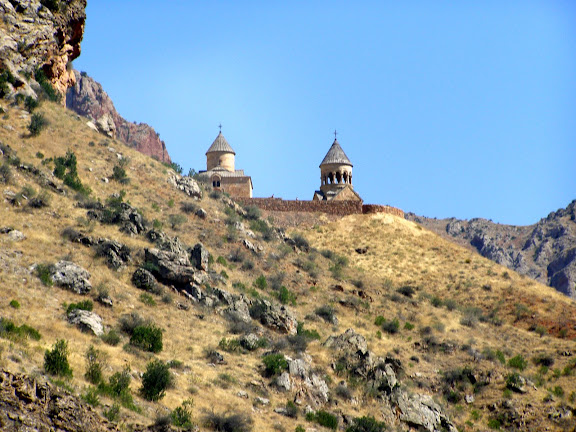
Noravank monastery
The road through Vayats Dzor into Syunik region was as stunning as the one from the Ararat Valley. We traveled mostly through valleys where the road stayed close to the Arpa River. We passed the Spandarian Reservoir which looked very tempting in the heat of the day, but unfortunately had no beaches for recreation. We continued through more villages and eventually we went through a police checkpoint indicating we were near the border with the controversial region of Nagorno-Karabagh. We soon got an even starker reminder of the fact that Armenia, even though in a ceasefire, is always ready for another conflict with Azerbaijan. On a large field near the highway we saw a large military camp complete with hundreds of troops, tents, tanks and war machinery. We kept going, expecting our turnoff into the village of Shaki. When it didn’t come after several miles, fearing that we would come to the Karabagh border, which was the least of our intentions, we turned the car around and made our way back through the now arid and dusty fields on top of mountains. We asked a group of soldiers near the camp for directions. They were very friendly and reassured us that the turnoff to Shaki is just after the police checkpoint we had passed earlier.
Finally in Shaki, we were forced to ask for directions again as our guidebooks turned out to be written very poorly. We finally found what we were looking for: in a gorgeous valley of the Vorotan River surrounded by fascinating rock formations is a hydro-electric water plant. We parked the car in front of the locked gate along with a couple of other cars and as no one answered our call, we climbed through a hole in the fence and started towards the plant. As we approached, about a dozen dogs, mainly tiny puppies, tried to scare us away with barking. Two workmen walked out of the plant. We greeted them and asked them whether it was possible to continue on. There was no problem and we started up a steep path, following another group. About ten minutes later we reached the river and turned to follow its course up on its right bank. The path narrowed to be wide enough for only one person. We finally heard the noise we’d been expecting and a few hundred feet later we reached the beautiful, wide Shaki Waterfall. This time of day was the best to come. The streams of water were illuminated by the setting sun and many small rainbows made the whole sight spectacular.
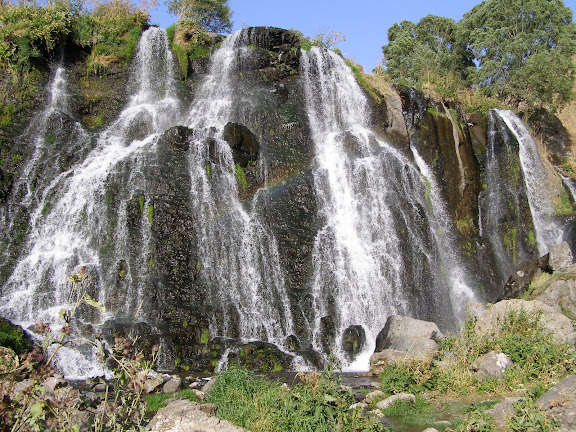
Shaki waterfall
On the way back, the electric plant workers joked with us, asking whether the waterfall is running – the plant controls the flow of the river.
With the sun setting and us fairly exhausted after the long drive, we made our way to Sisian, a small town where we were to spend the night. Dan wanted to go check in into the hotel, but I, after reading that our next point of interest was just at the outskirts of the town, suggested that we go look at it in the light of the setting sun. “Carahunge” as the name may suggest is are stone circle of some hundred and eighty scattered stones erected by ancient peoples for unknown reasons. It was a bit daunting to stand all alone in this place in the middle of fields on the Armenian mountains where so much and so little happened in the past centuries.
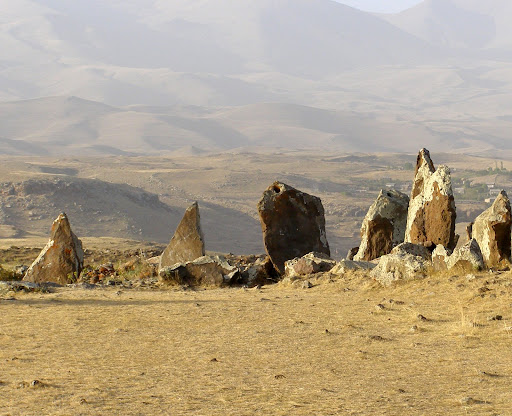
Carahunge stone circle
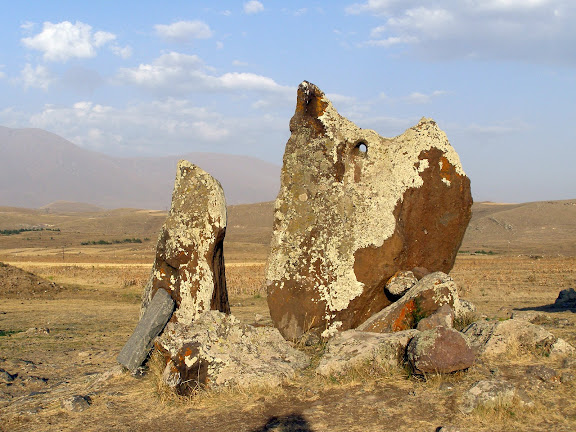
Astronomical tool?
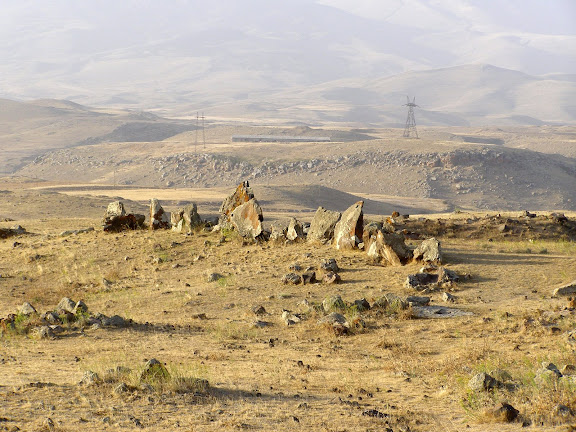
Carahunge
We arrived at the hotel at dusk and checked into our room, which was an individual house with three rooms and two bathrooms downstairs and upstairs. We chose an upstairs room with a private bathroom, which did not make a difference as we were the only guests in the hotel for that night and were therefore able to use all eight bathrooms in the house. After a short rest we ventured to the restaurant in the courtyard decorated in traditional Armenian style with carved furniture and rugs hanging on the walls.
We got a tour of the room where they bake homemade
lavash which consisted of a deep pit in the ground where a fire is made and dough rolled out thin and flat on a long oval shaped mitt, is slapped against the wall of the heated up pit and
voilà, you just peel the sheet of bread off the mitt.
Our dinner of cut up salami with fresh vegetables, fresh
lavash, hot instant couscous and canned corn tasted delicious in the cool evening and shortly after diner, exhausted from the long day's trip, we retired to our modest bedroom.
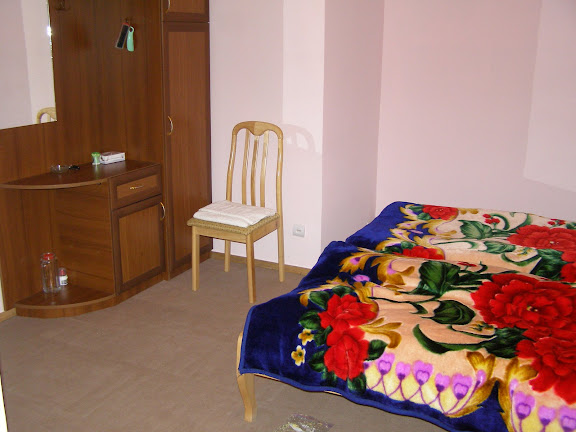
Sisian hotel room
Unlike Dan, who didn't know what to make of it, I was very fond of the heavy duvet made of chicken, or goose feathers. It felt exactly like the duvet I remember from spending my childhood summers in my maternal grandmother's house in Vištuk, a small village near Bratislava. Heavy and so toasty warm, soft as a cloud. I just hoped avian flu didn't transfer this way…
We woke up at dawn on Monday morning and after
davening, dressed for cold weather, we made our way to the restaurant for a cup of hot tea before we boarded the jeep we had arranged the day before. It was to take us to the 3,300 m (10,890 ft) high peak of Ughtasar, where ancient petroglyphs are still to be found.
The jeep was an hour late in coming because a part needed to be welded back on to it. I had thought highly of Russian made military vehicles before the thing rolled into the hotel courtyard with its roaring engine. Our driver Hamlet (this is a commonly used name in Armenia, yet so far I haven't found out how it came to be) had donned an Armenian military uniform for the occasion. Only later I found out that he participated in the 1979 Soviet campaign into Afghanistan.
We got in, I took shotgun, as I am prone to motion sickness and Dan occupied the back seat. I felt very American when I started searching for the non-existing seatbelt. Daniel announced that there is a hole in the floor and soon after we started on the road we started smelling the gasoline through this hole which only added to our nausea.
We were told the trip was to be an hour and half. After ten minutes on a paved road we turned into a field with barely visible tire tracks. And that's when the bumping and shaking began. My stomach was surprisingly fine. I kept my eyes on objects in the distance and was able to observe lots of interesting things like huge eagles taking off from the fields frightened by the sound of the approaching vehicle, and then diving back towards the ground where they were hunting for their breakfast of small rodents. While my stomach was okay, my bladder had issues with the shaking and already after a half hour we had to stop for the first pit stop. This turned out to be good, because Daniel who was quiet for some time, did not, as I assumed fall asleep, but was really sick. He got out of the car with a green face and had to walk around a bit to regain his balance.
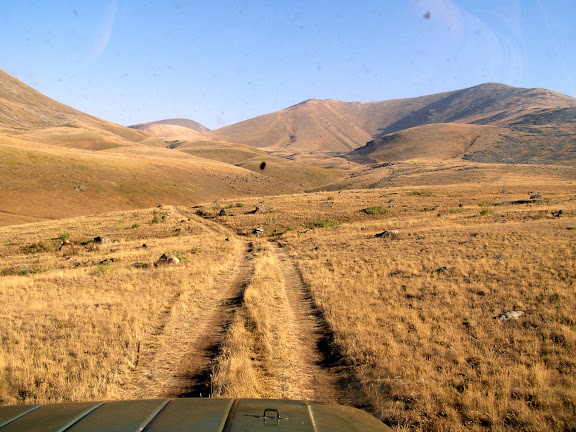
Jeep ride up to Ughtasar
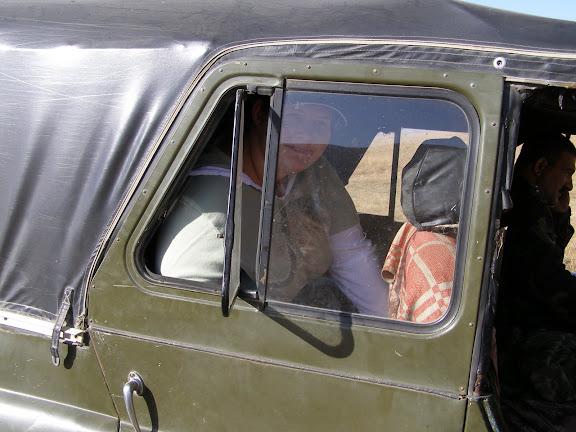
I gave up shotgun for sick Dan
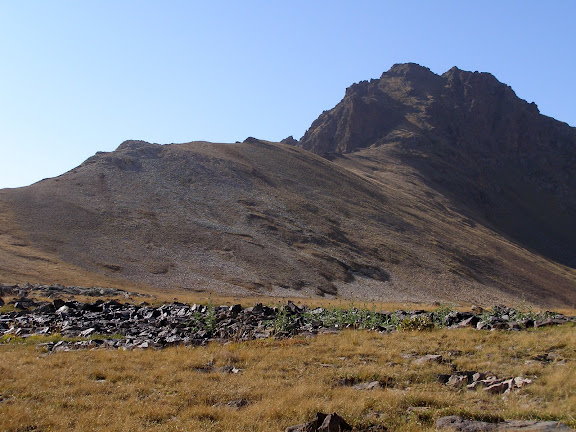
Jeep ride
We switched seats and I understood why Dan was so sick. The smell of gasoline was overbearing, the seats were so high up you could hardly look out through the windshield and the shaking was much worse than it had been in the front. As we ascended higher and higher, passing rocky fields of oats and barley and several herds of cows, I got more nauseous and had to go again. An hour into the trip this was already our second stop and it turned out we weren't even half way there. We switched seats and began to climb steeper and steeper hills. The "road" completely disappeared and at this point we were driving on yellow grass and rocks. At times the Uaz jeep tilted over sixty degrees into ravines and I don't know how it was that it didn't topple. I
mamish felt like I was riding in a toy car handled by a kid in a sand pit.
We climbed over a nasty hill and all of a sudden the sky was blue and the sun was shining - we were above the clouds. We were driving through a beautiful valley and we thought we must be very close. We passed stone circles made by shepherds to keep the sheep safe overnight and ahead of us we saw a steep road winding up another hill. Next to the road was a wide "waterfall" of volcanic rock creating one of the walls of the hill, which looked like it would tumble down if any of the rocks were removed. The driver was not very talkative and only once we started our slow climb up did we understand that we had to surmount this final, particularly steep cliff. Still in the back seat I felt like I would fall out through the back window. My bladder shaken into fullness again was about to explode and so I just clenched my teeth and waited for us to get up to the top.
When we made it, a wide plain was spread before us and we were surrounded by three peaks and a view of the dazzling valley we had come from. There were no large rocks to hide behind, and so I used the trick I learned in Suriname, where when we were surrounded by the most poisonous jungle in the world on both sides of the road, I had to squat behind the jeep to go. It worked in Armenia too. We switched seats, not knowing that after a five minute smooth drive we'd reach our destination.
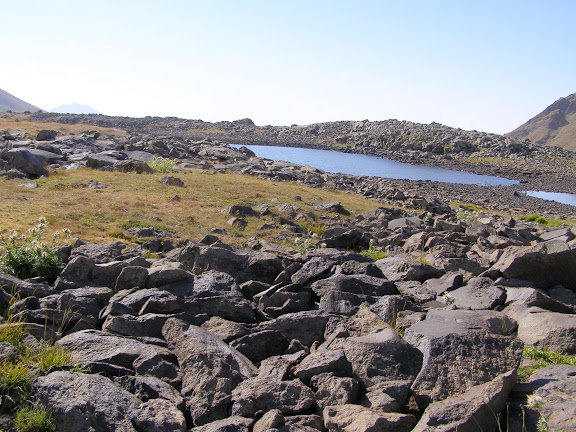
Lake surrounded by boulders
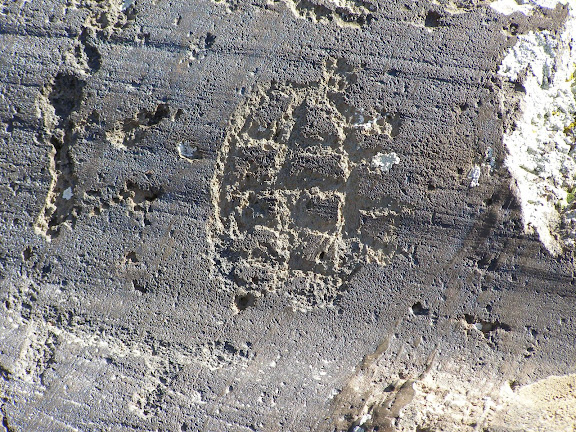
Ancient graffiti of a bug
On another plain a small round mountain lake glistened in the cold sunshine surrounded by rocks scattered about it. We gladly got out the jeep and followed Hamlet, jumping from rock to rock searching for the petroglyphs - rock drawings. We found many of them depicting antelopes, deer, snakes, bugs and bears. We made our way around the lake, descending to its surface, but soon made our way back up as the ground around it was very soft and we started sinking into the mud. We peered into the lake and I could swear I saw a trilobite٭ swimming in it. It must have been the mysterious ancient atmosphere of this place influencing my imagination. We wanted to drink from the clear icy water, but Hamlet stopped us saying it's no good (probably because of the trilobites).
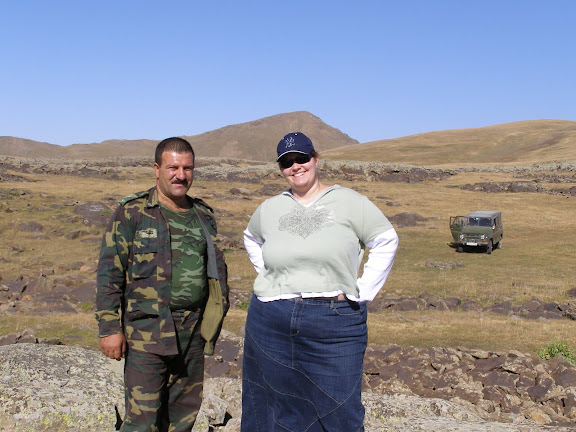
With Hamlet and his UAZ jeep
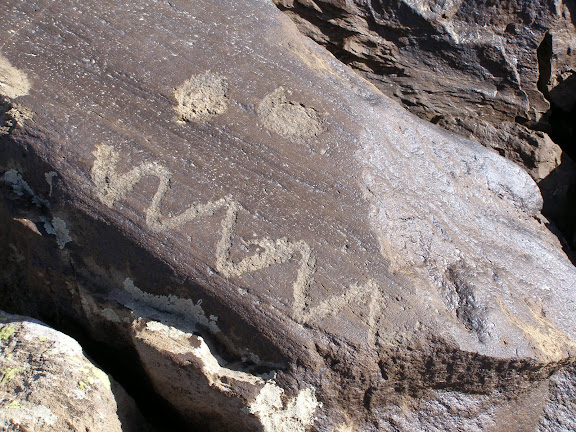
Petroglyph of a snake
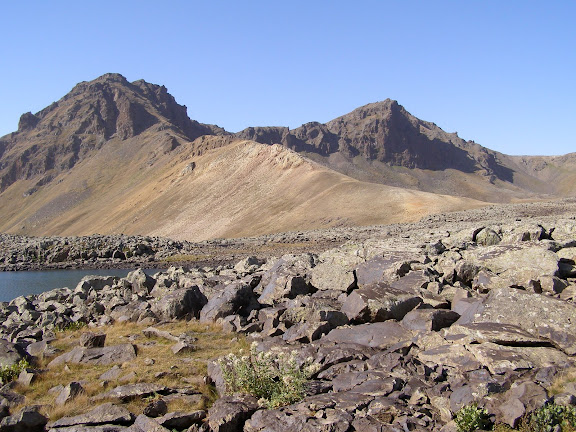
Surroundings of the lake
On the other side of the lake we realized that the "waterfall" of volcanic boulders we saw from the valley below was what prevented the water of the lake from spilling down the mountain. Another gorgeous view of the valley and clouds lay below us and after snapping lots of photos we walked back to another section of unexplored rocks near the jeep. On the way I found a beautiful growth of a nettle plant and was excited about another childhood memory of hikes in Slovakia. Dan did not know the effects of this plant, so I demonstrated them. The plant's leaves have tiny hairs on the bottom which when they prick the skin, they fill it with a small amount of mild poison which causes small itchy bumps something like tiny mosquito bites that disappear after a while. I always really liked the feeling of the innocent nettle rash and didn't miss the opportunity to experience it again.
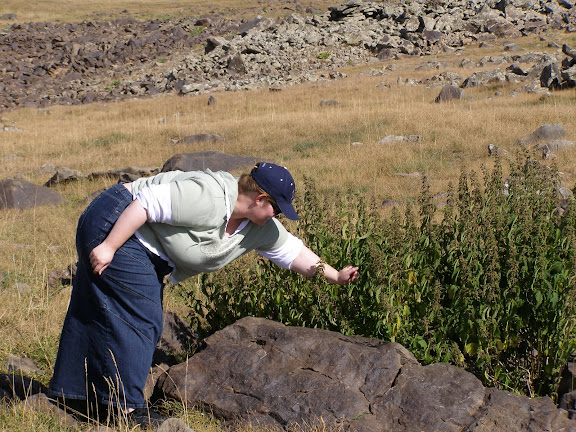
With nettle bush
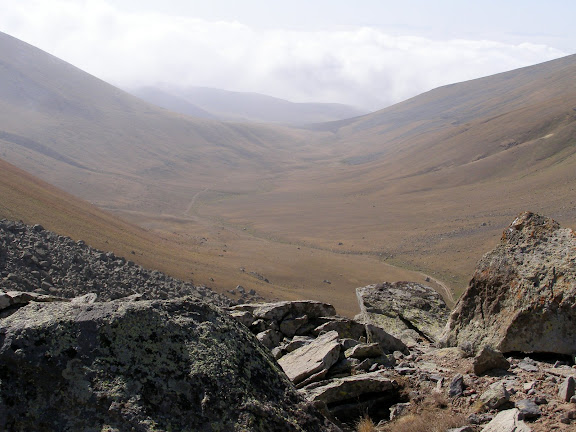
Valley above clouds and "waterfall of boulders"
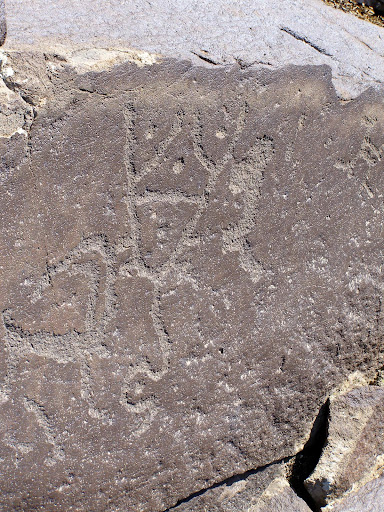
A strange petroglyph
The group of boulders that we explored next didn't only have pictures of animals. We discovered carvings of people in different situations as well. What struck us most was a carving of an obvious woman with six fingers on each hand. Kinda freaky, especially because of the trilobite.
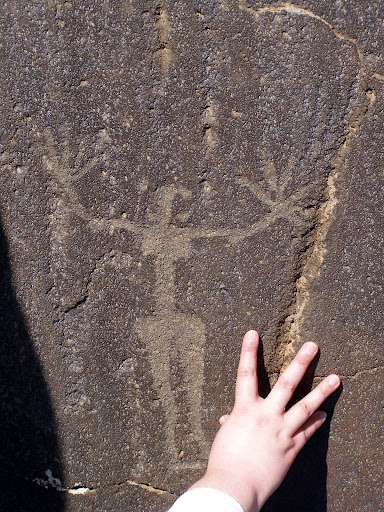
Six fingered woman with my hand for size comparison
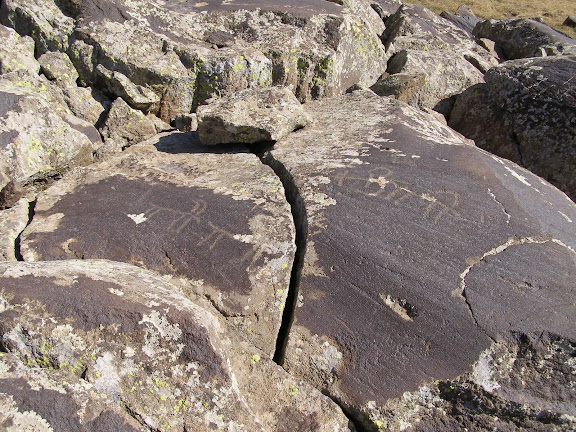
Petroglyphs
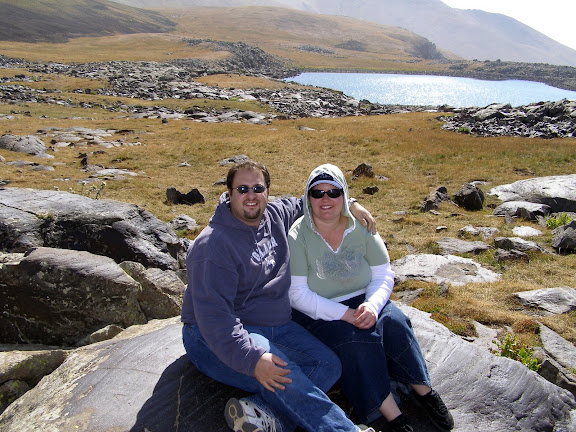
Dan and I with the glistening lake
It was pretty cold on the mountain and having done all that we could, we started our descent back to Sisian. I didn't realize how scary it would be driving down the steep mountainside along the volcanic boulder fall. By the time we got to the valley, my knuckles were white as snow, drained of all blood as I clutched a bar on the passenger side of the dashboard. Remember we were without seatbelts.
The ride down to town was okay after that, the only thrilling thing that occurred was that I may have spotted a European hoopoe, a bird species I've been wanting to see since we got into bird watching in The Gambia. By the time Hamlet stopped the Russian monstrosity and I got out, the bird was gone and I am not sure if it was what I was looking for. The only surprise awaiting us was back at the hotel where without discussing this prior to the joyride, Hamlet asked for $75 as his fee. It was worth it, but we are not doing this again.
All shaken up back in our hotel room in Sisian, we packed up our bags and quickly got out our room, infested with a swarm of flies, since we had left the window wide open. We had a nice lunch of Corn Flakes and long-life milk on the terrace of the hotel restaurant and drove around the corner to the post office where we were told by the receptionists we would be able to buy postcards. As we stepped into the post office building we were back in deep communism, four, inefficient postal workers sitting lazily behind a long empty counter staring into the space didn't even look at us even though besides us there was only one old man demanding to use one of the beaten up phone booths standing along a wall in the large room. When we asked for postcards they sent us to the room opposite us. The room was totally empty except for a large glass wall with several windows behind one of which was sitting a middle aged woman. We asked her for postcards which she was supposed to have had according to the people who sent us here. But no, she said, and disappeared in a room behind the glass wall. We noticed an interesting thing on the glass advertising a variety of postal services: an ad for a New Year congratulating telegram written in different languages had
Shana Tova written on it in Hebrew characters, but there was no Arabic seen anywhere on the telegram cover.
We left Sisian disappointed by the lack of any tourist services besides the lone hotel and started on our way back to Yerevan which we had wanted to reach before nightfall. Even with several shopping stops on the way at which we got some fantastic garlic and honey but no fish – the artificial fish ponds only contain catfish which is not
kosher and carp which we both hate – we got back to Yerevan with the sun still high in the sky.
I successfully parked the car near our building. We brought up our luggage and, glad that I had gotten the car back safely, I went to the bathroom. As I was taking off my skirt I heard something clink against the toilet bowl and splash. Only then did I realize that I had put the car key with its remote control behind my waistband so I wouldn't lose it as I didn't have a pocket. I fished out the key with my hand rinsed and dried it. It worked when I tried it. It worked in the morning when I was about to return the car and it worked when I locked the car up in front of the car rental office. Then, when the five guys who took care of the car went out to check it for me, it decided not to work and they started blaming me for breaking it. I said it had just worked for me to lock it up and I had had no problems with it for two days. Then when it finally worked for them, they finally let me leave.
٭ No animal better captures the drama of evolution and extinction. Long before the fish inhabited the seas and the Dinosaurs roamed the land, Trilobites appeared some 600 million years ago during the Cambrian period. They belonged to the phylum Arthropodal (joint-footed), a phylum which to this day represents the most successful (78%) of all animal life forms, including crabs, centipedes, spiders, shrimps and insects. The Trilobites, living in shallow seas, flourished as swimmers, crawlers and burrowers for some 350 million years. They evolved rapidly into many beautiful, bizarre and, even by today's standards, futuristic forms.
Source of text: www.trilobite.com

Trilobite similar to the one I think I saw
Source of picture: tiscalinet

